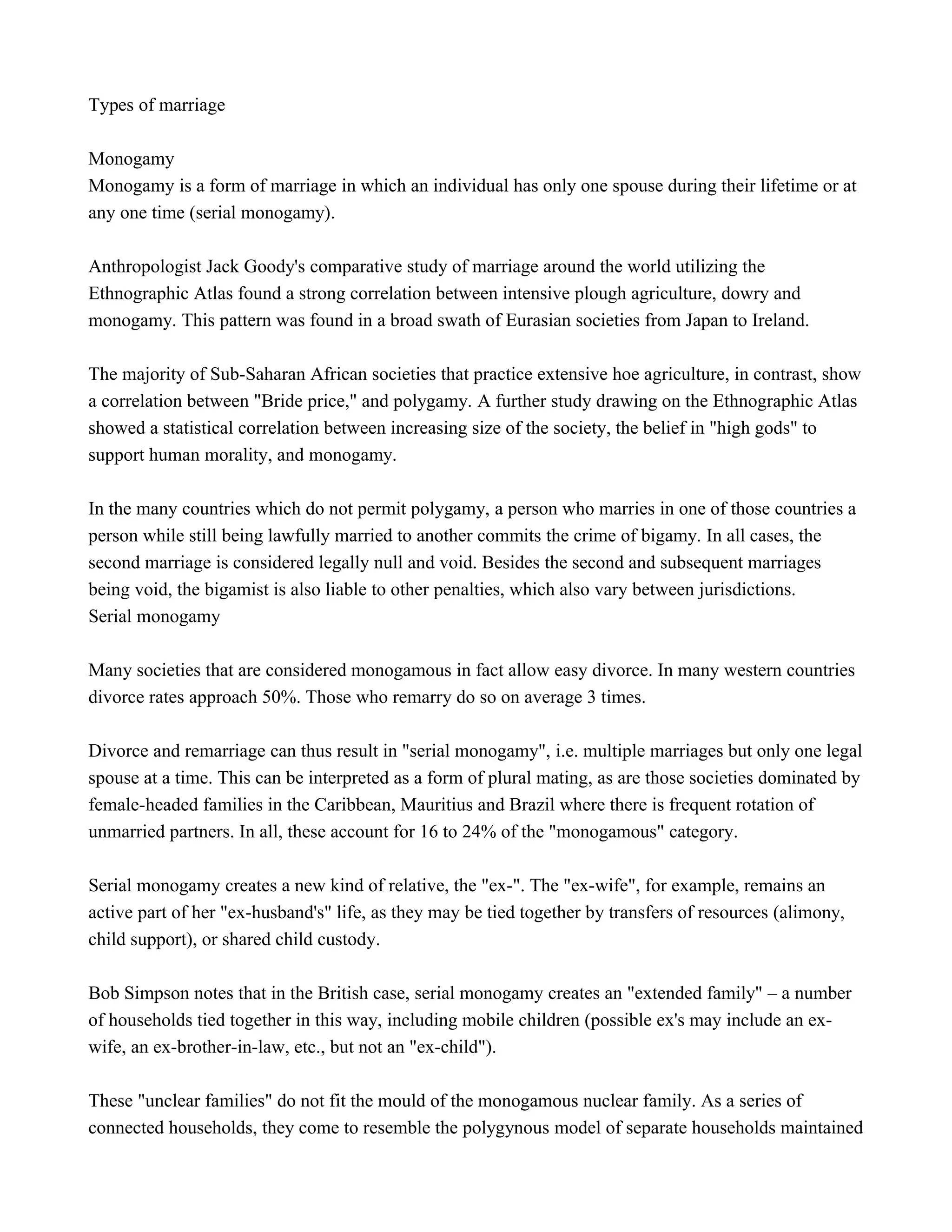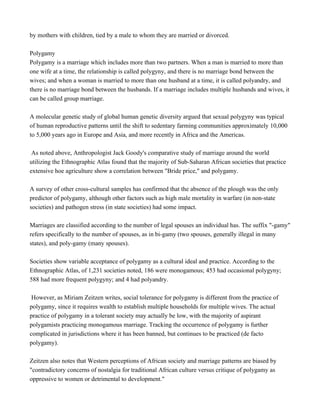The document discusses different types of marriage including monogamy, serial monogamy, polygamy, polygyny, polyandry, and group marriage. Monogamy allows one spouse at a time while serial monogamy involves multiple marriages but only one legal spouse at a time through divorce and remarriage. Polygamy allows multiple spouses and can take the form of polygyny where a man has multiple wives or polyandry where a woman has multiple husbands. Group marriage involves all members of the group being married to each other. Factors like agriculture, religion, and social norms influence which types of marriages are commonly practiced in different cultures and societies.


![Polygamy has been condemned as being a form of human rights abuse, with concerns arising over
domestic abuse, forced marriage, and neglect. The vast majority of the world's countries, including
virtually all of the world's developed nations, do not permit polygamy, and there have been growing
calls for the abolition of polygamy in many developing countries.
Polygyny
Although a society may be classified as polgynous, not all marriages in it necessarily are; monogamous
marriages may in fact predominate. It is to this flexibility that Anthropologist Robin Fox attributes its
success as a social support system: "This has often meant – given the imbalance in the sex ratios, the
higher male infant mortality, the shorter life span of males, the loss of males in wartime, etc. – that
many women were left without husbands and had to be killed at birth, remain single, become
prostitutes, or be siphoned off into celibate religious orders. Polygynous systems have the decided
advantage that they can promise, as did the Mormons, a home and family for every woman."[24]
Nonetheless, polygyny is a gender issue which offers men asymmetrical benefits. In some cases, there
is a large age discrepancy (as much as a generation) between a man and his youngest wife,
compounding the power differential between the two.
Tensions not only exist between genders, but also within genders; senior and junior men compete for
wives, and senior and junior wives in the same household may experience radically different life
conditions, and internal hierarchy.
Several studies have suggested that the wive's relationship with other women, including co-wives and
husband's female kin, are more critical relationships than that with her husband for her productive,
reproductive and personal achievement.
In some societies, the co-wives are relatives, usually sisters, a practice called sororal polygyny; the pre-
existing relationship between the co-wives is thought to decrease potential tensions within the
marriage.
Fox argues that "the major difference between polygyny and monogamy could be stated thus: while
plural mating occurs in both systems, under polygyny several unions may be recognized as being legal
marriages while under monogamy only one of the unions is so recognized. Often, however, it is
difficult to draw a hard and fast line between the two."
As polygamy in Africa is increasingly subject to legal limitations, a variant form of de facto (as
opposed to legal or de jure) polygyny is being practised in urban centres. Although it does not involve](https://image.slidesharecdn.com/typesofmarriage-140516022853-phpapp02/85/Types-of-marriage-3-320.jpg)
![multiple (now illegal) formal marriages, the domestic and personal arrangements follow old
polygynous patterns. The de facto form of polygyny is found in other parts of the world as well
(including some Mormon sects and Muslim families in the United States).
In some societies such as the Lovedu of South Africa, or the Nuer of the Sudan, aristocratic women
may become female 'husbands.' In the Lovedu case, this female husband may take a number of
polygamous wives. This is not a lesbian relationship, but a means of legitimately expanding a royal
lineage by attaching these wives' children to it. The relationships are considered polygynous, not
polyandrous, because the female husband is in fact assuming masculine gendered political roles.[26]
Religious groups have differing views on the legitimacy of polygyny. It is allowed in Islam and
Confucianism, though in most areas today it is uncommon.Judaism, Christianity and Hinduism have
allowed polygyny in the past, but it is prohibited today.
Polyandry
Polyandry is notably more rare than polygyny, though less rare than the figure commonly cited in the
Ethnographic Atlas (1980) which listed only those polyandrous societies found in the Himalayan
Mountains.
More recent studies have found 53 societies outside of the 28 found in the Himalayans which practice
polyandry.It is most common in egalitarian societies marked by high male mortality or male
absenteeism. It is associated with partible paternity, the cultural belief that a child can have more than
one father.
The explanation for polyandry in the Himalayan Mountains is related to the scarcity of land; the
marriage of all brothers in a family to the same wife (fraternal polyandry) allows family land to remain
intact and undivided.
If every brother married separately and had children, family land would be split into unsustainable
small plots. In Europe, this was prevented through the social practice of impartible inheritance (the dis-
inheriting of most siblings, many who went on to become celibate monks and priests).
Plural marriage
Group marriage (also known as multi-lateral marriage) is a form of polyamory in which more than two
persons form a family unit, with all the members of the group marriage being considered to be married
to all the other members of the group marriage, and all members of the marriage share parental
responsibility for any children arising from the marriage.
No country legally condones group marriages, neither under the law nor as a common law marriage,](https://image.slidesharecdn.com/typesofmarriage-140516022853-phpapp02/85/Types-of-marriage-4-320.jpg)
